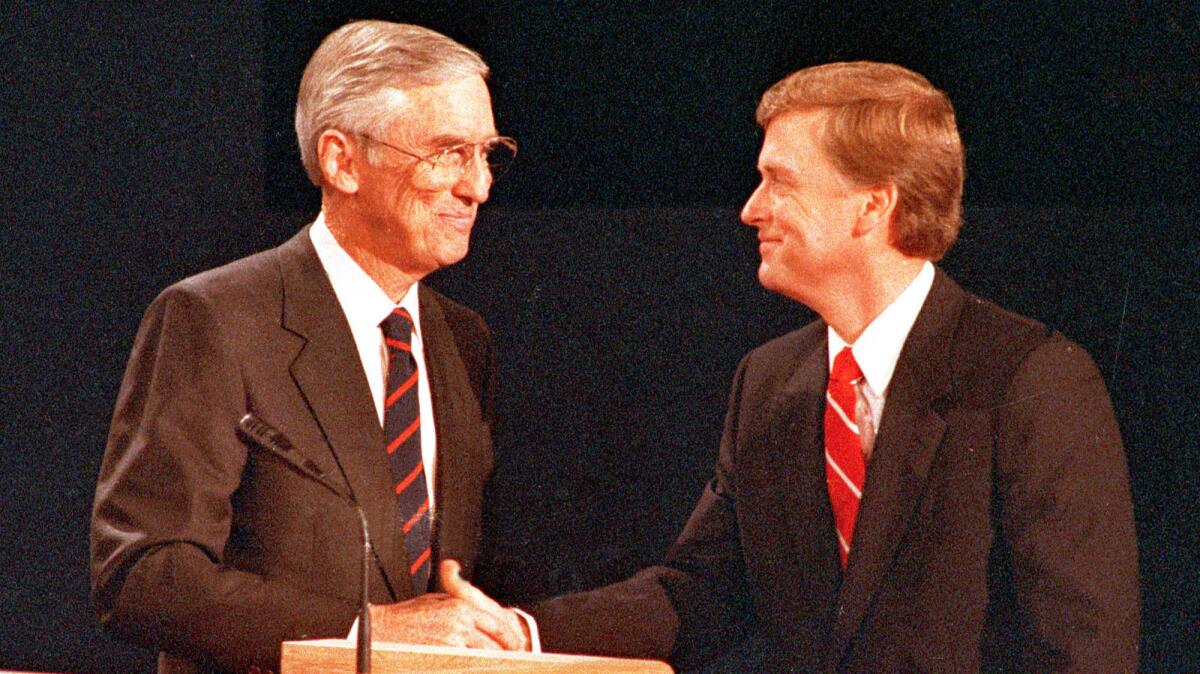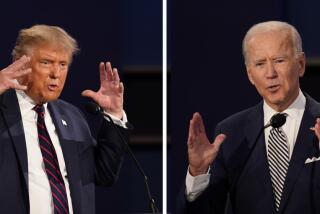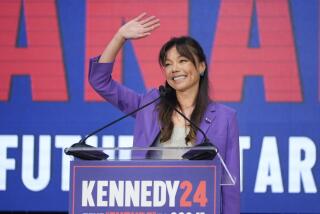‘Senator, you’re no Jack Kennedy’ almost didn’t happen. How it became the biggest VP debate moment in history

Dennis Eckart still has the sheet from the yellow legal pad where he wrote it down: “Quayle thinks he’s JFK!”
The year was 1988. And Eckart had spent weeks reviewing videotapes of Indiana Sen. Dan Quayle’s public appearances, hoping to get inside the head of the vice presidential candidate.
Eckart, then a young Democratic congressman from Ohio, had been asked to portray Quayle in mock debates aimed at prepping Texas Sen. Lloyd Bentsen, the Democratic nominee for vice president.
Vice presidential debates are seldom consequential, and Tuesday’s, between Indiana Republican Gov. Mike Pence and Democratic Sen. Tim Kaine of Virginia, is unlikely to be.
But the 1988 meeting would go down as the most memorable in decades — a pop culture moment that outshined many presidential debates — all because Bentsen landed a zinger that devastated Quayle and helped cement his reputation as a lightweight that would follow his political career. Operatives from both parties still remember the camera angles on the stage that day in Omaha, Neb., the lines and pauses in the exchange, and Quayle’s lost look in the aftermath.
Election 2016 | Live coverage on Trail Guide | Sign up for the newsletter | The race to 270
“It’s a part of lore,” Eckart said recently, retelling one of his favorite stories.
“I remember this like it was yesterday,” said Tad Devine, who served as Bentsen’s campaign manager and went on to help guide Vermont Sen. Bernie Sanders’ Democratic primary campaign this year.
But it would have never happened if Bentsen had his way. The Texas senator was so nervous that he begged his staff to cancel the debate, fearing the 41-year-old Quayle had an overwhelming advantage.
“Dan Quayle was the quintessential television candidate,” Eckart recalled. “The camera was very kind to him. He looked good. He developed quips.”
Bentsen, then 67, was born before the era of television. His timing was off. He did not respond well to the lighting, Devine said in a recent interview.
Devine made a nominal attempt to call it off, knowing it was a fool’s errand. Then he got to work, weeks before the debate, preparing Bentsen. That included tutorials on where to position his body or shift his gaze, when to play to the camera and how to consolidate his answers into 90-second responses and minute-long rebuttals. And they practiced, over and over, using mock stage sets with mock moderators, with Eckart in the role of Quayle.
Eckart recalled the lengths the campaign went to collect footage of Quayle. This was before campaigns had full-time trackers following opposing candidates with tiny cameras or phones, before YouTube or livestreaming allowed for instant fact checks or memes. They sent crews to small cities to record Quayle giving speeches and traveled to local television stations to copy tapes of speeches they could not attend. Eckart stayed up nights in his house watching it, drawing suspicion from his 9-year-old son that he was suddenly obsessed with Republicans.
On the campaign trail, Quayle almost always faced questions about his youth and inexperience, including his service in the National Guard during Vietnam. Eckart recalls that it was in one of the Dakotas that he noticed Quayle began keeping his left hand in his coat pocket and brushing back his hair.
“It was so reminiscent of Jack and Bobby Kennedy,” Eckart said.
When a reporter asked about his readiness to become president, Quayle pointed to the similarities between John F. Kennedy’s resume and his own — early 40s, a few years in Congress. It was a line Quayle leaned on increasingly.

Mike Pence and Tim Kaine face off on the debate stage for the first time Tuesday tonight. Here’s what to expect.
Quayle did not respond to a request for comment sent to his company’s spokesman. Bentsen died in 2006.
When it came time for the mock debates, Eckart repeated the comparison to Bentsen.
“I kept doing this and Bentsen would look at me incredulous,” Eckart recalled. “Just incredulous. I was clearly striking a chord with him, but he wasn’t responding.”
“Bentsen was almost getting angry at me,” he added.
After one such rehearsal in a fancy hotel conference room in Texas, Bentsen’s small group of staffers began critiquing his performance.
Bob Shrum, a veteran Democratic operative brought in to help, asked Bentsen whether he had known Kennedy. Shrum, long a speechwriter for Kennedy’s brother, former Sen. Edward M. Kennedy, had already been considering how Quayle’s comparison could be used as an attack line. He had urged his old boss to make a statement calling the comparison odious, but Kennedy thought Bentsen could more effectively employ the issue himself, during the debate, Shrum said.
At Shrum’s prodding, Bentsen unloaded: Yes, he knew Kennedy. He served with him in Congress, was friends with him, revered him.
“He finished with, ‘And there is no way he can compare himself to John F. Kennedy,’” Eckart said.
The four staffers in the room with Bentsen, including Susan Estrich, all agreed he needed to respond just as forcefully during the debate, and to make sure to look at Quayle when he did so, to underline the moment’s gravity. Bentsen remained reticent, Eckart said, worried about any whiff of opportunism at the expense of an assassinated president.
Finally, the moment came. Quayle probably sensed the trap.
During the debate, he answered questions about his qualifications several times without mentioning Kennedy. Finally, when the question was repeated again by moderator Tom Brokaw, Quayle looked annoyed.
Bentsen’s staff was huddled in the bowels of the convention center, watching nervously on television.
After explaining what steps he would take if forced into the presidency — and all the gravity that moment would entail — Quayle invoked Kennedy.
Bentsen responded, slowly but firmly.
“I served with Jack Kennedy,” he said, his tone escalating toward steady indignation. “I knew Jack Kennedy. Jack Kennedy was a friend of mine. Senator, you’re no Jack Kennedy.”
Just a few feet from Bentsen’s staffers, Quayle’s were huddled behind a cloth partition, and the phones began ringing.
“We knew panic was setting in,” Devine said.
The Democratic campaign, with Massachusetts Gov. Michael Dukakis at the top of the ticket, was aggressive from the get-go, using the one-liner in commercials, making the case that George H. W. Bush was putting the country at risk by choosing Quayle as his understudy.
But the victory demonstrated the limited impact of debates, especially those involving running mates. Thirty-four days later, Bush won in a landslide. And Quayle, not Bentsen, was a heartbeat away from the presidency.
Twitter: @noahbierman
How Honduras helped vice presidential candidate Tim Kaine find his mission in life
Trump wanted to fire women who weren’t pretty enough, say employees at his California golf club
More to Read
Get the L.A. Times Politics newsletter
Deeply reported insights into legislation, politics and policy from Sacramento, Washington and beyond. In your inbox three times per week.
You may occasionally receive promotional content from the Los Angeles Times.







